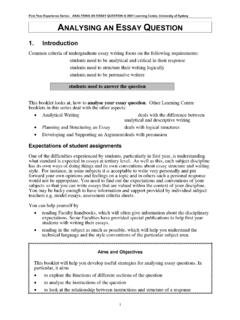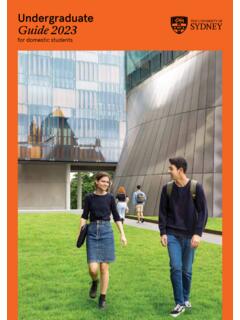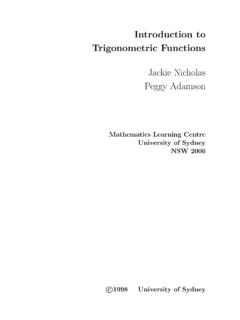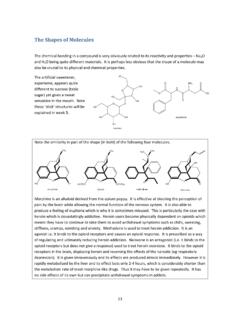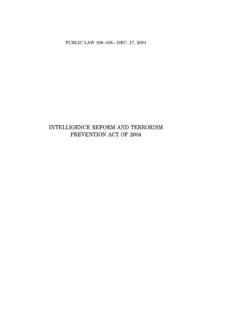Transcription of Writing a thesis proposal - University of Sydney
1 Writing A thesis proposal : INDEPENDENT LEARNING RESOURCES Learning Centre, The University of Sydney 1 Learning Centre Writing A thesis proposal INDEPENDENT LEARNING RESOURCES Learning Centre Room 722, Level 7 Education Building A35 T +61 2 93513853 F +61 2 93514865 E A thesis proposal : INDEPENDENT LEARNING RESOURCES Learning Centre, The University of Sydney 2 Contents (1) Introduction 3 (2) What is a thesis proposal ? 10 (3) Writing the proposal 12 (4) The Introduction 14 (5) Making the Purpose Clear 17 (6) Bringing it all Together 21 (7) Evaluation of the proposal 22 Appendix A thesis proposal Models - Social Sciences 25 Appendix B thesis proposal Models - Science and Engineering 33 The contribution of Henrike Korner and Helen Drury to earlier versions of this publication is gratefully A thesis proposal : INDEPENDENT LEARNING RESOURCES Learning Centre, The University of Sydney 3 Objectives After you have worked through these materials, you should be able to: Focus your thesis topic Understand the purpose of the thesis proposal Understand the general structure of a thesis proposal Understand the purpose and structure of the introduction of a thesis proposal Be clear about how to formulate research questions, aims, objectives.
2 Some sections have exercises for you to complete. Some of these exercises provide an answer key marked with the symbol (1) Introduction There is no one "definitive" way to choose a research topic and to get it accepted. In fact, there are probably as many ways as there are departments in a University . Some departments require a proposal , others don't. Some departments require a detailed proposal , others are satisfied with a general preliminary outline. Some departments require students to present their proposals at a research seminar, others circulate proposals among staff and often a student will have an interview with a potential supervisor. Despite this variety of procedures, there are still some general issues that all students should consider before they start their research, even if they don't have to write a proposal at all. Different Degrees - Different Theses A thesis is usually required from students who do Honours, Masters and PhD degrees.
3 At the Honours level, the thesis is one part of the overall degree, at the Master or other Doctoral level it can be one part of the degree in conjunction with coursework or the whole degree, and at the PhD level, the thesis constitutes the sole requirements of the degree. Length, scope, depth and originality of the thesis depend on the degree which it is for. The following table presents an overview of the general expectations of a thesis at Honours, Master s and PhD level. Writing A thesis proposal : INDEPENDENT LEARNING RESOURCES Learning Centre, The University of Sydney 4 HONOURS MASTERS MINOR thesis MASTERS MAJOR thesis PHD DEFINITION A substantial project which demonstrates an understanding of the research process and scholarly conventions of the discipline. An ordered, critical exposition of knowledge gained through student s own effort. Demonstrates sound under-standing of research process. Shows evidence of advanced knowledge in a specialist field.
4 Candidate has: conducted a substantial piece of research; has been conceived conducted and reported by the candidate under academic supervision in an academic environment for a prescribed period. SCOPE Similar to Masters minor thesis . Not necessarily new line of enquiry or contribution to knowledge, but still locates topic in context of critical review. Demonstrates knowledge of appropriate methodology. Not necessarily new line of enquiry, but shows that student has mastered research and synthesising skills in producing a contribution to knowledge. Similar to Masters Research degree, but deeper, more comprehensive treatment of subject. SCHOLARSHIP Demonstrates ability to present study in a disciplined way in scholarly conventions of the discipline. Shows evidence of independent investigation and testing of hypotheses. Ability to make critical use of published work. Appreciation of relationship of topic to wider field of knowledge.
5 Competence in independent work. Understanding of approaches and techniques appropriate to research question. Should draw generalisations or further hypotheses for testing. Demonstrates authority in candidate s field and shows evidence of knowledge in relevant cognate field. Mastery of appropriate methodological techniques and awareness of limitations. Makes a distinct contribution to knowledge. Originality of approach or interpretation. Ability to communicate research findings effectively in professional and international contexts. Research apprenticeship is complete and holder is admitted to the community of scholars in the discipline. LENGTH Varies by department; depends on weighting against coursework. 10,000 - 20,000 words, depends on weighting against coursework. Varies by faculty; max. 50,000 words. Max. 100,000 words. (adapted from Powles, 1994:24-25) Writing A thesis proposal : INDEPENDENT LEARNING RESOURCES Learning Centre, The University of Sydney 5 Differences According To Disciplines There are also considerable differences between the sciences, the humanities and the social sciences as far as students' range of topic choice, students' degree of freedom in choosing specific research questions, and the overall timing of the research project is concerned.
6 The following table provides an overview of disciplinary influences on topic selection. SCIENCES HUMANITIES SOCIAL SCIENCES/ APPLIED PROFESSIONAL FIELDS RANGE restricted range of choice; suitable topics made available by department according to staff expertise, research interest and research funding students usually required to initiate own topics; take into account supervisor s interests and availability of data wide range of practices: from close direction of science model to deliberate absence of direction of the humanities model DEGREE OF FREEDOM students may have more freedom on deciding research question, but often close direction by supervisor supervisor reluctant to interfere in topic choice, theoretical perspective, method, specific research question topics and research questions often derived from field of student s professional practice GUIDANCE/ TIMING research question decided early; schedules, timelines, deadlines are important supervisor guides student in understanding how the chosen theoretical framework is situated against existing theoretical development in the field or in related fields identification of specific research question may take considerable time as students require a good deal of disciplinary and method-ological grounding before they are able to formulate specific research questions (adapted from Parry and Hayden, 1996:2-3) Exercise Think about the following questions: Into what disciplinary area does your research field fall?
7 Can it be clearly located in one area or does your research go across disciplines? Depending on the amount of preparation you have already done, what has been your experience with regard to topic choice, degree of freedom and guidance? If you are still very much at the beginning of your research, think about what problems you might encounter and how you might deal with them. Writing A thesis proposal : INDEPENDENT LEARNING RESOURCES Learning Centre, The University of Sydney 6 Is My Topic Feasible? You may start with a rather vague idea of a research topic. It is then necessary to assess how the topic can be narrowed down to potential sub-topics for more thorough consideration. The following checklist contains one set of general questions, and five sets of specific questions for specific types of topics. It is recommended that you read all the questions in all sub-sections because the questions may trigger ideas that you have not considered previously.
8 Also, you will not be able to answer all the questions at this stage. Rather, use them to guide your thinking. (a) Questions about the topic in general (1) Is there current interest in this topic in your field or in a closely related field? (2) Is there a gap in knowledge that work on this topic could help to fill or a controversy that it might help to resolve? (3) Is it possible to focus on a small enough segment of the topic to make a manageable thesis project? (4) Can you envisage a way to study the topic that will allow conclusions to be drawn with substantial objectivity. Is the data collection approach ( test, questionnaire, interview) acceptable in your school? (5) Is there a body of literature available relevant to the topic? Is a search manageable? (6) Are there large problems ( logistic, attitudinal) to be surmounted in working in this topic? Do you have the means to handle them? (7) Does the topic relate reasonably well to others done in your department?
9 If not, do you have any information about its acceptability? (8) Would financial assistance be required? If yes, is it available? (9) Are the needed data easily accessible? Will you have control of the data? (10) Do you have a clear statement of the purpose, scope, objectives, procedures, and limitations of the study ? Do you have a tentative table of contents? Are any of the skills called on by the study skills that you have yet to acquire? (b) Questions for topics employing a research question or hypothesis (1) Do you have acceptable statements of research questions or hypotheses? (2) Can you specify how you will answer the questions or test the hypotheses? (3) Would the thesis be a contribution if the findings do not support the hypotheses or fail to answer the questions? (4) Have subsidiary questions or hypotheses been identified that deserve study along with the major ones? (5) Are there alternative questions or hypotheses that might explain the findings anticipated?
10 (c) Questions for topics requiring interviews for data collection (1) What style or type of interview is best suited to the objectives of the study ? (2) Does an interview protocol exist that fits the purposes of the investigation? Has it been pilot tested? (3) How will the data be recorded and collated for optimum speed, accuracy, and reliability? Writing A thesis proposal : INDEPENDENT LEARNING RESOURCES Learning Centre, The University of Sydney 7 (4) How will matters of confidentiality and permission be handled? (5) How will bias in the interviewer and the respondent be minimised or measured? (d) Questions for topics using a questionnaire approach (1) What form of questionnaire will be most productive for this kind of study ? Has it been tested? (2) How will questionnaire items be related specifically to the purpose of the investigation? (3) Why is the questionnaire the tool of choice for data collection? (4) How will it be assured that the questionnaire will be answered?

